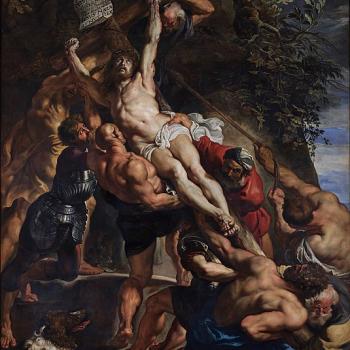It began last Friday when Canada’s Prime Minister Stephen Harper attended a Catholic funeral mass for a former Canadian government official. Harper, who is Protestant, went to the altar during communion and received a sacramental wafer from the presiding priest. A 40-second video clip shows Harper accepting the wafer but not putting it in his mouth.
What did the guest do with the host? Did the Prime Minister pocket the Body of Christ? As a non-catholic, should the Prime Minister have even received or accepted the communion wafer? Is this really what constitutes a political scandal in Canada?
Wafergate might not rise to the U.S. level of a true political scandal, but it does highlight the challenges of respectfully observing the religious rituals of others, even when those others are fellow Christians. For Roman Catholics, unlike their Protestant brothers and sisters, the bread and wine of the Blessed Sacrament of the Eucharist are more than mere symbols.
“(The wafer) is not a symbol of the body and blood of Christ, but is in fact the body and blood of Christ,” Neil MacCarthy, director of communications for the Roman Catholic Archdiocese of Toronto, told the National Post. “We believe we are holding Jesus in our hands, so to put Jesus in your pocket or to put Jesus on the ground (is serious). If it falls on the ground it has to be consumed. We never throw Jesus out,” MacCarthy said.
The Prime Minister’s Office said Harper did no such thing. “The priest offered the host to the Prime Minister, the Prime Minister accepted the host and he consumed it,” says press secretary Dimitri Soudas.
But Monsignor Brian Henneberry, vicar general and chancellor in the Diocese of Saint John, says there are two issues: First, if Harper did pocket the wafer, “It’s worse than a faux pas, it’s a scandal from the Catholic point of view.” Second: “If the prime minister is not a Catholic, he should not have been receiving communion and if he comes up it places the priest in an awkward position, especially at a national funeral because everyone is watching,” he told the Telegraph-Journal.
As Notre Dame professor M. Cathleen Kaveny pointed out in an On Faith discussion on this issue last year, if anyone is at fault in this sort of situation, it’s the priest who serves communion, not the person who receives it.
“The canon law of the Roman Catholic Church specifies that “Catholic ministers may lawfully administer the sacraments only to Catholic members of Christ’s faithful” (Canon 844), Kaveny wrote. “It does not, however, specify that people . . . may not present themselves for communion (since canon law claims jurisdiction only over Catholics), and it does not specify how a priest ought to respond if a non-Catholic presents himself or herself for Communion, especially at a funeral mass. Other norms apply, particularly the norm of avoiding scandal. The sound application of canon law in particular cases requires pastoral judgment — that particular combination of prudence and charity that good ministers of all faiths seem to have in common.”
In the same discussion, Catholic theologian John Dominic Crossan raised a larger issue: “Who should accept the eucharistic ritual? Those and only those who are intentionally, self-consciously, and publicly committing themselves to live like Jesus and, if unfortunately ever necessary, to die like Jesus.”
It sounds like Mr. Harper too realized he should not be receiving Communion, which is why he didn’t eat the host, though apparently he did later, which would go back to the original problems. But I’m struck by that last paragraph. Here again we see that the issues of the Reformation still remain. Though Lutherans appear to outsiders to be similar in many ways to Roman Catholics–believing in Christ’s real presence in the bread and wine, practicing closed communion–they remain nearly opposites in their views of what it all means and whether communion and salvation itself are a matter of law or gospel. Is Christianity all about having to live like Jesus, or is it about receiving His forgiveness because we fail to do so? Contrast the paragraph above with what the Catechism teaches:
18. Finally, why do you wish to go to the Sacrament?
That I may learn to believe that Christ, out of great love, died for my sin, and also learn from Him to love God and my neighbor.
19. What should admonish and encourage a Christian to receive the Sacrament frequently?
First, both the command and the promise of Christ the Lord. Second, his own pressing need, because of which the command, encouragement, and promise are given.
UPDATE: Commenters have pointed out that Crossan is the radical theologian of the Jesus Seminar, which denies the truth of the Bible and is not an orthodox Catholic at all. (I wonder if he is allowed to commune!) My understanding, though, is that Rome does teach that receiving the Sacrament is seen as a good and meritorious work, that it requires moral preparation, and that the grace it gives conveys the power to do good works, which play an essential role in salvation. I’d be interested to hear from Catholics if this understanding is correct and if they agree with Crossan on at least this one statement that he makes.











